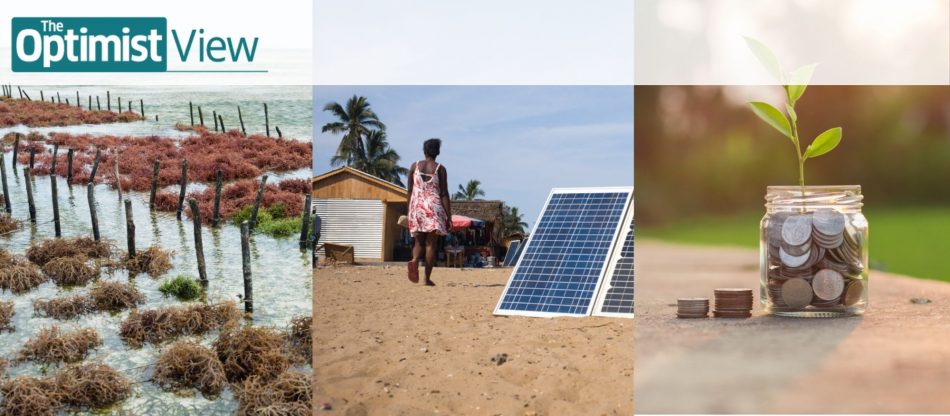“An investment in knowledge pays the best interest.” – Benjamin Franklin
BY: AMELIA BUCKLEY
Many of us want to live more sustainable, ethical lives, but what about putting our money where our mouths are? Literally. Traditional investment portfolios have relied heavily on fossil fuels and large corporations for stable diversification. The steady demand for oil and gas combined with the “too big to fail” nature of huge companies encouraged many investors to nestle comfortably into the not-so-ethical pockets of companies that put profits over people and the planet.
However, a rocky recovery from the 2008 recession and a potentially even more devastating economic toll of a global pandemic has demonstrated that impact investing and “do good” businesses could be beneficial for the planet and our wallets, especially during times of uncertainty. A study found that portfolios with strong sustainability ratings performed well even as the pandemic caused the stock market to falter.
Ins and outs of impact investing
Let’s take a step back. What is impact investing? Impact investing is essentially investing for social good. It’s putting money behind companies that contribute to the common good in three key categories: environment, social, and governance. These categories give impact investing its nickname and acronym, E.S.G.
So far in 2020, 64 percent of actively managed E.S.G. funds beat their performance benchmarks versus 49 percent of traditional funds. Additionally, the S&P 500 technology E.T.F. (exchange-traded funds) is up 25 percent this year, while the S&P 500 energy E.T.F., which includes oil and gas stocks, is down 34 percent.
The term “impact investing” was coined in 2007, and according to the 2020 Annual Impact Investor Survey from the Global Impact Investing Network, the value of the impacting investing market is now $715 billion. The survey also found that 88 percent of respondents reported meeting or exceeding their financial expectations with impact investing.
Hazel Henderson and science-based investing

One of the “founding mothers” of this concept is Hazel Henderson. Henderson is the founder of Ethical Markets Media whose goal is to “foster the evolution of capitalism beyond current models based on materialism, maximizing self-interest and profit, competition and fear of scarcity.”
Although she calls herself an “anti-economist,” Henderson acknowledges that markets, in some form, have always played a role in human society. In an interview with our partner, Solutions News, she said “The thing is that science-based investing can be militantly profitable.”
By science-based investing, she means tried and tested technology to transition our world to a sustainable green economy. This includes things like advancements in electric vehicles, more efficient batteries, regenerative agriculture, carbon capture, and more! The sky’s the limit when it comes to green innovation.
One manifestation of this science-based investing is the investment advisory group based in London called Southbank Investment Research. They hosted the Beyond Oil seminar where they invited leading tech experts that understand not only the environmental, but also the financial efficiency motivations behind the demise of fossil fuels. When green energy is more efficient, cheaper, creates jobs, and is good for the planet, why would investors continue to waste their time with outdated oil? Need more convincing? According to the Green Investment Scoreboard, private green investments totaled $8.1 trillion globally in 2017. And they continue to grow.
Part of the reason for the transition to environmental impact investing is a general shift towards greener technology in most sectors. For example, we recently wrote about Exxon Mobil being dropped from the Dow Jones Industrial Average. Dropping its longest-tenured member is a big win for environmental groups and a signal that fossil fuels are not the future, but the drop was not entirely propelled by a love for the environment, but rather the growing success of the renewables sector as well as the more than shaky performance of crude oil prices during the pandemic.
Case study: Propagate Ventures

Many impact investing opportunities involve supporting companies that implement green, regenerative practices. The same sustainable practices that help the planet, also help investors. Take Propagate Ventures for example. We interviewed CEO Ethan Steinberg a couple weeks ago to learn about the concept of agroforestry and the impact investment support system behind it. Agroforestry uses reforestation and crop diversification on farms to nourish the soil, prevent erosion, save water, boost insect activity, and more, while impact investors reap returns from increased and diversified yields.
The same sustainable agricultural practices that contribute to improved crop yields offer a tantalizing investment opportunity. Propagate Ventures connects impact investors with farms looking to green up their practices, providing a win-win-win situation for the farms, the planet, and investors.
In our interview with Steinberg on the Optimist Daily Update, he explained, “We want to remove those barriers to entry so that our farmers, our landowners, and out investors who hope to get involved in this as an impact investment can have some clarity around how to make this really viable and do well and do good at the same time.”
The future of E.S.G.s
People didn’t have such confidence in E.S.G.s initially. Vital Farms, another sustainable agriculture-focused company, was founded in 2007 in Austin, Texas, to sell eggs from pasture-raised hens. Investors were skeptical at first, but the company is now valued at more than $1 billion.
A lot of impact investing revolves around environmental issues, but that is only one component of E.S.G. funds. Impact investments can also focus on health, education, community building, supporting small businesses, and fair trade. Granted, many of these topics are intertwined with sustainability, but there are a wide range of “do good” avenues to choose from.
You can do it too!
So what does it take to start impact investing? Unfortunately, in today’s financial market, ruling out conscious companies isn’t always a simple task. Socially conscious investing used to be simply cutting out the big three: tobacco, alcohol, and firearms, but in today’s modern world, we recognize that conscientiousness is more complex.
Kate Sinding Daly, executive director of the NorthLight Foundation, told the New York Times that rooting out eco-conscious companies is easy, but it gets more difficult when it comes to assessing human rights, gender issues, arms, and military investments.
If you want to pick and choose the impact investments that matter most to you, you can put together your own portfolio, but the easiest way to get started is to go through an established impact investing firm or portfolio. Fortunately, there are many to choose from.
Calvert Impact Capital is a nonprofit that moves capital into communities around the world through fixed-income securities that can be purchased online or by mail starting at $20. They also offer investing opportunities with a $1,000 minimum through a brokerage account or financial adviser.
Community Capital Management Inc. has a fixed-income mutual fund, CRA Qualified Investment Fund (CRATX), that invests along 18 impact themes. The Case Foundation offers both impact investing opportunities and inclusive entrepreneurship programs to address urgent social challenges. Even the investment giant Vanguard has a social index fund.
 The tide of investment is changing. In our modern world we no longer have to choose between upholding our values and profitable investments. We at The Optimist Daily are firm believers in the potential to do well and do good simultaneously. The great news is many people agree with us. A 2015 study found that 90 percent of millennials would switch brands to one associated with a cause they support. Why not switch investments too?
The tide of investment is changing. In our modern world we no longer have to choose between upholding our values and profitable investments. We at The Optimist Daily are firm believers in the potential to do well and do good simultaneously. The great news is many people agree with us. A 2015 study found that 90 percent of millennials would switch brands to one associated with a cause they support. Why not switch investments too?
Our hard-earned money is a powerful vehicle for social change. Every time you spend money somewhere, you’re essentially voting with your dollar. Supporting small businesses, buying sustainable products, and boycotting unethical brands are all great ways to express your values. Impact investing goes one step further and allows you to invest in causes you stand behind, support a better future for our planet and make money while you’re at it!
About the Author:
 Amelia Buckley is a staff writer for the Optimist Daily based in Santa Barbara, CA. As a global studies major and lover of the outdoors, Amelia is passionate about crafting stories that focus on critical global issues that impact our environment and natural spaces.
Amelia Buckley is a staff writer for the Optimist Daily based in Santa Barbara, CA. As a global studies major and lover of the outdoors, Amelia is passionate about crafting stories that focus on critical global issues that impact our environment and natural spaces.












